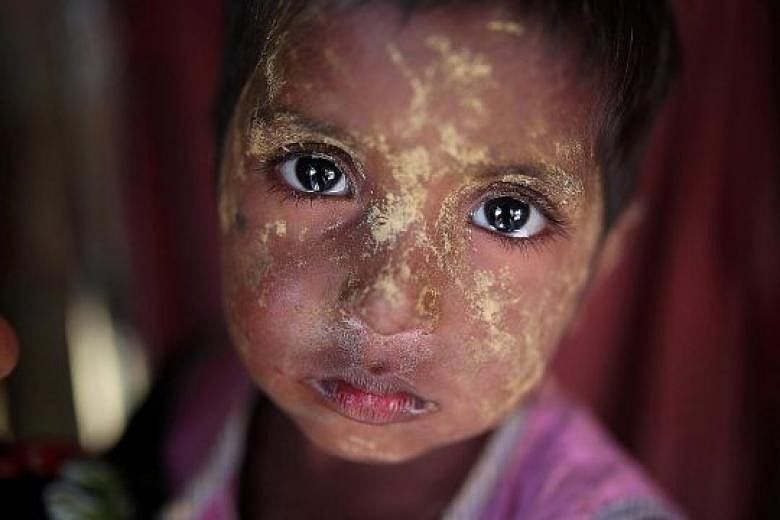The politics of hatred provided fertile ground for the mass atrocities witnessed by the world last year, rights group Amnesty International said in a scathing report on Thursday.
Pointing to the military crackdown on Rohingya Muslims in Myanmar and the desperate flight of 655,000 refugees out of the country, it called the catastrophe the "bitter fruit" of political leaders demonising entire groups of people on the basis of their identity.
This political trend became mainstream and reverberated across the globe, said the Britain-based group in its annual report on the state of the world's human rights.
It slammed United States President Donald Trump's efforts to ban all citizens of several Muslim-majority countries from entering the USas "transparently hateful".
The spectre of hatred and fear loomed also in Europe, where politicians were largely unwilling to grapple with the global refugee crisis.
Election candidates in Austria, France, Germany and the Netherlands "sought to transpose social and economic anxieties into fear and blame, especially against migrants, refugees and religious minorities", said the 408-page report covering five regions and 159 countries.
Politicians were not the only ones fanning the flames of hatred.
"Abusive policies and practices that denied human rights to certain groups enjoyed popular support in many countries too," said Amnesty.
It cited a large-scale nationalist march with xenophobic slogans in the Polish capital of Warsaw and a white supremacist rally in America's Charlottesville as signs of how polarised societies were last year.
But many also responded to demonisation and injustices by speaking out powerfully against them.
Across India, activists fought back against rising Islamophobia and organised rallies in several cities against a series of attacks against Muslims.
The #MeToo global phenomenon shone a spotlight on the pervasiveness of sexual abuse and harassment as survivors of sexual violence told of their experiences and offenders were held to account.
"2017 also demonstrated the enduring willingness of people to stand up for their rights and for the values they want to see in the world," said the report.
Amnesty said the responses of social media companies to online abuse of women and minorities were "weak and inconsistent".
Governments also turned a blind eye to the incitement of hatred against minorities, it added.
DEMONISATION OF MINORITIES
Amnesty accused the Myanmar government of both allowing and directly producing hate speech inciting discrimination and violence in print and online.
"State media published derogatory anti-Rohingya articles; government officials published inflammatory posts on social media," it said.
This worsened the crisis in the Rakhine state, sparked by the Myanmar military's violence against civilians in response to attacks by Rohingya militants on police posts in late August last year.
But the warning signs had long been visible, said Amnesty.
The Rohingya had for many years been "routinely demonised and stripped of the basic conditions needed to live in dignity", and this systemic discrimination and segregation had become normal, it added.
Asean and its governments were also silent over the human rights abuses in Myanmar, it said.
"The transformation of discrimination and demonisation into mass violence is tragically familiar, and its ruinous consequences cannot be easily undone," it said.
In India, religious minorities - particularly Muslims - faced increasing demonisation by hardline Hindu groups, said Amnesty.
At least 10 Muslim men were lynched by cow protection vigilante groups, many of which Amnesty said "seemed to operate with the support of members of the ruling Bharatiya Janata Party".
Violence against members of the Dalit caste, also known as the "untouchable" caste , also continued.
ANTIPATHY TO REFUGEES
In America, President Trump signed a number of executive orders which affected migrants, asylum seekers and refugees.
This included an order to reduce the number of refugees eligible for admission to America, and another to build a wall along the USA-Mexico border.
His attitude towards refugees and asylum seekers was mirrored in Europe, which received 170,000 refugees - less than half the number of arrivals in 2016.
The report highlighted how European Union members encouraged countries which housed refugees in transit to implement stricter border control measures, without adequate human rights guarantees.
This approach resulted in refugees in Libya being held in "horrific conditions of extreme overcrowding", said Amnesty. In November, CNN reported that migrants in Libya were being sold into slavery by smugglers.
Said Amnesty International secretary general Salil Shetty: "Leaders of wealthy countries have continued... regarding refugees not as human beings with rights but as problems to be deflected."
He called for an approach of seeking "constructive answers - rooted in human rights - to the frustrations, anger and alienation that provide a ready context for toxic political narratives of blame."


